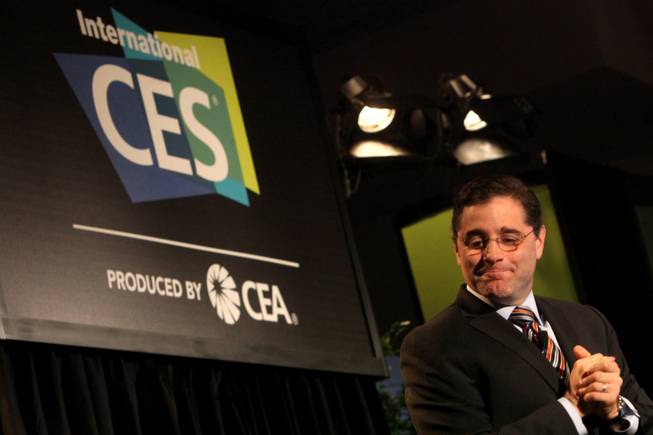
FCC Chairman Julius Genachowski speaks during a one-on-session at CES on Friday, Jan. 7, 2011, at the Las Vegas Convention Center.
Friday, Jan. 7, 2011 | 5:47 p.m.
CES: Timelapse Tour of Technology
Get an inside look at the biggest technology convention in the world, the Consumer Electronics Show.
2011 International CES
Beyond the Sun
Upping the amount of the wireless spectrum available for consumer tech devices is the Federal Communications Commission’s top priority for 2011, the agency’s chairman said Friday.
Chairman Julius Genachowski told a packed house at a session at the International Consumer Electronics Show in Las Vegas that the country’s demand for the spectrum -- fueled in part by consumers’ hunger for airwave-sucking devices like smart phones, netbooks and tablets -- is likely to outstrip supply if no adjustments are made. He also said he fears the U.S. could lose its post as a global leader in wireless development if additional broadband spectrum isn’t made available.
The wireless spectrum is finite.
“If we don’t tackle the spectrum crunch now, network congestion will grow, and consumer frustration will grow with it,” he said. “We have to move, and we have to move faster than our global competitors.”
Referencing the vast number of wireless devices on the show floor at CES, Genachowski said the country’s mobile future was becoming increasingly evident.
“The future success of this industry and our innovation future depends on whether our government acts quickly to unleash more spectrum -- the oxygen that sustains our mobile devices,” he said.
He cited an FCC report released Friday that indicates the number of mobile devices with three or more wireless transmitters has increased 700 percent in the past three years. Mobile broadband is being adopted far faster than any computing technology in history, he said.
He has some solutions in mind.
In his speech, Genachowski emphasized voluntary incentive auctions, calling them a “breakthrough mobile policy idea.”
Outlined in a bill introduced in Congress last year, voluntary incentive auctions are a means by which broadcasters would be compensated for either returning or sharing some of the 300 megahertz of spectrum they are allotted.
Ultimately, he wants 500 megahertz of spectrum freed up for broadband -- almost double what’s currently available.
Some broadcasters, wary that losing spectrum could hurt their digital transmissions and own mobile television initiatives, have been critical of the auction plans.
“We can’t create more spectrum, so we have to make sure it’s used efficiently,” Genachowski said, adding that the incentive auction proposal “would unlock substantial value that’s now untapped because of outdated policies.”
Genachowski said the regulatory agency is ready to move forward with the auctions in the “next year or two” if Congress grants the FCC the authority to do so.
The number of over-the-air viewers as opposed to viewers who subscribe to cable or satellite services has dropped from 100 percent of all television watchers to less than 10 percent, he said.
“Whether or not most Americans know the physics of spectrum, they know what it feels like to have a dropped call or a slow connection or cranky Wi-Fi,” he said.
Last year, the FCC was largely focused on Internet access, or “net neutrality,” rules which were enacted in December.

Join the Discussion:
Check this out for a full explanation of our conversion to the LiveFyre commenting system and instructions on how to sign up for an account.
Full comments policy